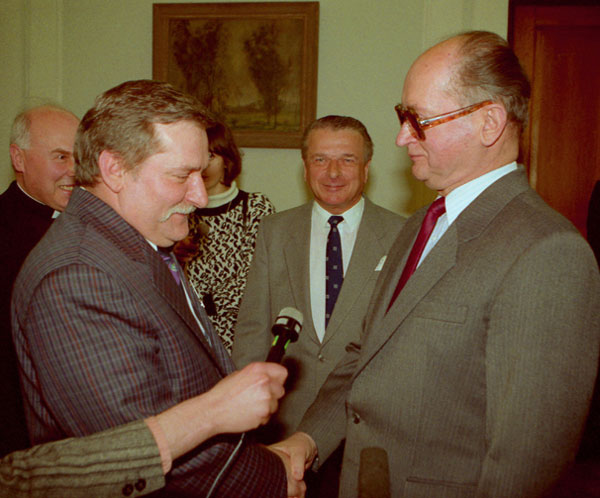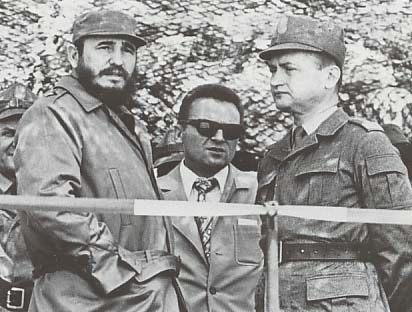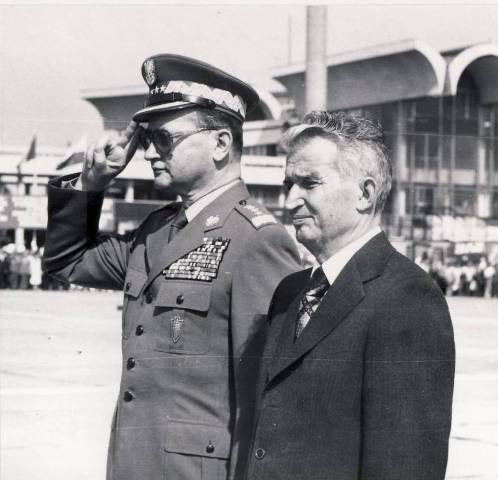<Back to Index>
- Biochemist Axel Hugo Theodor Theorell, 1903
- Composer Alberto Nepomuceno, 1864
- President of the Republic of Poland Wojciech Witold Jaruzelski, 1923
PAGE SPONSOR
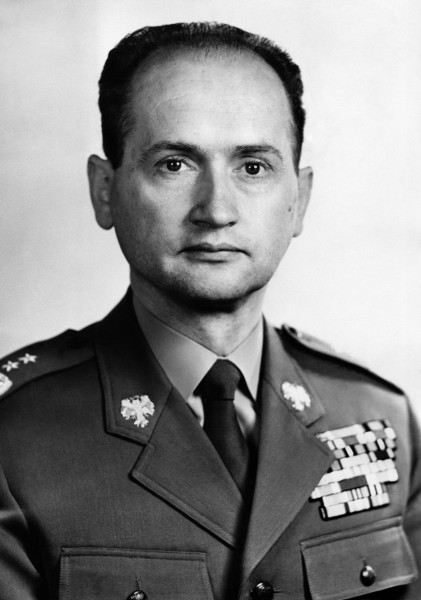
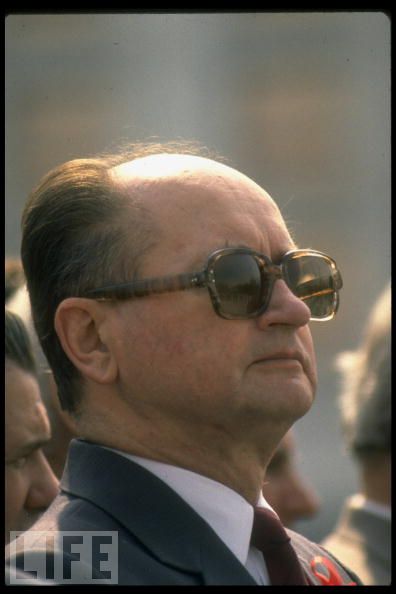
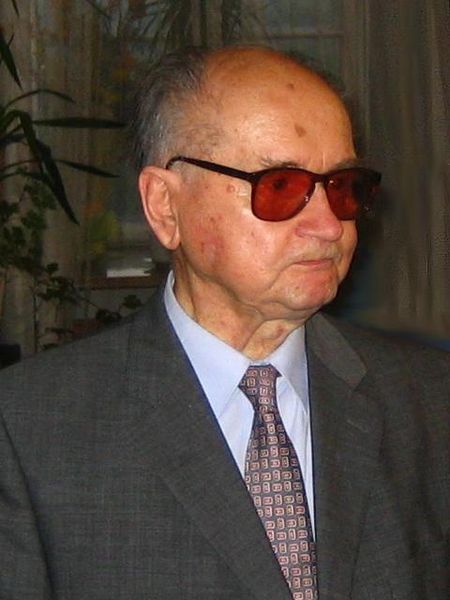
Wojciech Witold Jaruzelski (born 6 July 1923) is a retired Polish military officer and Communist politician. He was the last Communist leader of Poland from 1981 to 1989, Prime Minister from 1981 to 1985 and the country's head of state from 1985 to 1990. He was also the last commander-in-chief of the Polish People's Army (LWP). He resigned from power after the Polish Round Table Agreement in 1989 led to democratic elections in Poland.
Wojciech Witold Jaruzelski was born on 6 July 1923 in Kurów, into a family of gentry. He was raised on the family estate near Wysokie (in the vicinity of Białystok). He was educated in a Catholic school during the 1930s.
On 1 September 1939, the September Campaign started when Poland was invaded by Germany, with the latter country aided by another invasion begun sixteen days later by the Soviet Union. The invasions resulted in the defeat of Poland by the following month, and its partition between Soviet and German control. During the campaign, Jaruzelski and his family were captured by the army of the Soviet Union, and deported to that country. In 1940 at the age of sixteen, Jaruzelski was sent to the Kazakh Soviet Socialist Republic, where he performed forced labour in the Karaganda coal mines. During his labour work, he became an orphan, and having experienced snow blindness, developed permanent damage to his eyes and back. He was later selected for enrollment into the Soviet Officer Training School by the Soviet authorities. During his time in the Kazakh Republic, Jaruzelski wanted to join the non-Soviet controlled Polish exile army led by Władysław Anders, but in 1943, by which time the Soviet Union was fighting in Europe against Germany in the Eastern Front, he joined the Polish army units being formed under Soviet command. He served in the Soviet sponsored First Polish Army during the war. He participated in the Soviet military takeover of Warsaw and the Battle of Berlin, both of which occurred in 1945. By the time the war ended that year, he had gained the rank of lieutenant. He "further credited himself in Soviet eyes" by engaging in combat with the Polish Home Army, an anti-communist organization, from 1945 to 1947.
After the end of the war, Jaruzelski graduated from the Polish Higher Infantry School, an event which was followed by a graduation from the General Staff Academy. He joined Poland's communist party, the Polish United Workers Party, in 1948 and started to denounce people for the Soviet supervised Main Directorate of Information of the Polish Army using the cover name Wolski. In the first post-war years, he was among the military fighting the Polish anti-communist guerrillas ("cursed soldiers") in the Świętokrzyskie region. A BBC News profile of Jaruzelski says that his career "took off after the departure [from Poland] in 1956 of the Soviet Field Marshal, Konstantin Rokossovsky", who had been Poland's Commander in Chief and Minister of Defence. Jaruzelski became the chief political officer of the Polish armed forces in 1960, its chief of staff in 1964; and he became the Polish Minister of Defense in 1968, four years after he was elected to be a member of the Central Committee of the Polish United Workers Party. He participated in an antisemitic campaign in the army, during which more than 1000 Jewish officers were demoted and expelled from the army. Even the non Jewish minister of defence Marian Spychalski was persecuted and Jaruzelski obtained his post.
In August 1968 general Jaruzelski as the minister of defense ordered the 2nd Army under general Florian Siwicki (of the "LWP" ) to invade Czechoslovakia,
resulting in military occupation of northern Czechoslovakia until
November 11, 1968 when under his orders and agreements with the Soviet
Union his Polish troops were withdrawn and replaced by the Soviet Army. In 1970, he was involved in the successful plot against Władysław Gomułka, which led to the appointment of Edward Gierek as Communist Party General Secretary. He took part in organizing the brutal suppression of striking workers, and his orders to the communist military led to massacres in the coastal cities of Gdańsk, Gdynia, Elbląg and Szczecin. In December 1970, Jaruzelski became a candidate member for the Politburo of the Polish United Workers Party, the chief executive body of the communist administration of Poland, obtaining full membership the following year. On 11 February 1981, Jaruzelski was elected Prime Minister of Poland and became the First Secretary of the Central Committee of the Polish United Workers Party on October 18 the same year. Before initiating the plan, he presented it to Soviet Premier Nikolai Tikhonov. On 13 December 1981, Jaruzelski imposed martial law in Poland and in doing so became a dictator. He was the member of the Military Council of National Salvation. A BBC News profile of Jaruzelski contends that the establishment of martial law was "an attempt to suppress the Solidarity movement." According to Jaruzelski, martial law was necessary to avoid a Soviet invasion. In a May 1992 interview with Der Spiegel, Jaruzelski said Given
the strategic logic of the time, I probably would have acted the same
way if I had been a Soviet general. At that time, Soviet political and
strategic interests were threatened. However at a press conference in September 1997 Viktor Kulikov, former supreme commander of Warsaw Pact forces, denied that the Soviet Union had either threatened or intended to intervene. According to Politburo minutes from 10 December 1981, Yuri Andropov stated
"We do not intend to introduce troops into Poland. That is the proper
position, and we must adhere to it until the end. I don’t know how
things will turn out in Poland, but even if Poland falls under the
control of Solidarity, that’s the way it will be." Jaruzelski
also claimed in 1997 that Washington had given him a "green light",
stating that he had sent Eugeniusz Molczyk to confer with then
Vice-President George H.W. Bush and Bush had agreed with Molczyk that martial law was the lesser of two evils. Whether this meeting with the American vice-president occurred is disputed. Historical evidence released under Russian President Boris Yeltsin has
been brought to light indicating that the Soviet Union did not plan to
invade Poland; in fact, the Soviets strictly rejected Jaruzelski's
request for military help in 1981, leaving the Solidarity "problem" to
be sorted out by the Polish government (Soviet reaction to the Polish Crisis of 1980 - 1981).
However, the exact plans of the Soviet Union at that time have never
been determined. Jaruzelski, however, has justified cracking down by
alleging that the threat of Soviet intervention was quite likely had he
not dealt with Solidarity internally. This question, as well as many
other facts about Poland in the years 1945 – 1989, are presently under the investigation of government historians at the Institute of National Remembrance (Instytut Pamięci Narodowej, IPN), whose publications reveal facts from the Communist era archives.
Additionally, there are numerous confirmations from Czech army officers
of the time speaking of "Operation Krkonose", plan of armed invasion of
Poland, because of which many units of the People's army of the
Czechoslovakia were stationed on highest alert, ready for deployment
within hours. In 1982 he helped (rather ordered) reorganize the Front of National Unity, the organization the Communists used to manage their satellite parties, as the Patriotic Movement for National Rebirth. In 1985, Jaruzelski resigned as prime minister and defence minister and became chairman of the Polish Council of State - -a post equivalent to that of president or a dictator,
with his power centered on and firmly entrenched in his coterie of
"LWP" generals and lower ranks officers of the Polish Communist Army. The policies of Mikhail Gorbachev also stimulated political reform in Poland. By the close of the tenth plenary session in December 1988, the Communist Party was forced, after strikes, to approach leaders of Solidarity for talks. From 6 February to 15 April 1989, negotiations were held between 13 working groups during 94 sessions of the roundtable talks. These negotiations "radically altered the shape of the Polish government and society", and resulted in an agreement which stated that a great degree of political power would be given to a newly created bicameral legislature. It also created a new post of president to act as head of state and chief executive. Solidarity was also declared a legal organization. During the following Polish elections the Communists won 65 percent of the seats in the Sejm,
though the seats won were guaranteed and the Communists were unable to
gain a majority, while 99 out of the 100 seats in the Senate freely
contested were won by Solidarity backed candidates. Jaruzelski won the presidential ballot by one vote. Jaruzelski was unsuccessful in convincing Wałęsa to include Solidarity in a "grand coalition" with the Communists, and Jaruzelski resigned his position of general secretary of the Polish Communist Party. The Communists' two allied parties broke their long standing alliance, forcing Jaruzelski to appoint Solidarity's Tadeusz Mazowiecki as the country's first non-Communist prime minister since 1948. Jaruzelski resigned as Poland's leader in 1990. He was succeeded by Wałęsa in December. Subsequently, Jaruzelski faced charges for a number of actions such as murder that he committed while he was Defense Minister during the Communist period. On 31 January 1991, General Jaruzelski retired from the army service.
In an interview conducted in 2001, Jaruzelski said that he believes communism failed, that he is a social democrat, and that he backed Aleksander Kwaśniewski, who at that time was the President of Poland, as well as Leszek Miller, who would later become the Prime Minister of Poland. In May 2005, Russian President Vladimir Putin awarded a medal commemorating the 60th anniversary of victory over Nazi Germany to Jaruzelski. Other former leaders awarded the medal include Romania's former King Michael I. Czech President Václav Klaus criticized this step, claiming that Jaruzelski is a symbol of the Warsaw Pact troops' invasion of Czechoslovakia in
1968. Jaruzelski said that he had apologized and that the decision on
the August 1968 invasion had been a great "political and moral mistake". On 28 March 2006, Jaruzelski was awarded a Siberian Exiles Cross by Polish President Lech Kaczyński. However, after making this fact public Kaczyński claimed that this was a mistake and blamed the bureaucracy for
giving him a document containing 1293 names without notifying him of
Jaruzelski's presence within it. After this statement Jaruzelski
returned the cross. On 31 March 2006, the IPN charged him with committing communist crimes, mainly the creation of a criminal military organization with the aim of conducting crimes (mostly concerned with the illegal imprisonment of people). The second charge involves the incitement of state ministers to commit acts beyond their competence. Jaruzelski has avoided most court appearances citing poor health.
Jaruzelski
is a controversial person in Poland. Some people, many of them a part
of the "Solidarity generation", have a highly negative opinion of him,
believing that Jaruzelski "is little short of a traitor", even comparing his philosophy of "a strong Poland within a Soviet dominated block" to Vidkun Quisling's
philosophy of a similar status for Norway within the Nazi controlled
hemisphere. Opinion polls, as of 15 May 2001, suggest that a majority
of the Polish people are open to agreeing with his explanation that
martial law was implemented to prevent a Soviet invasion.
